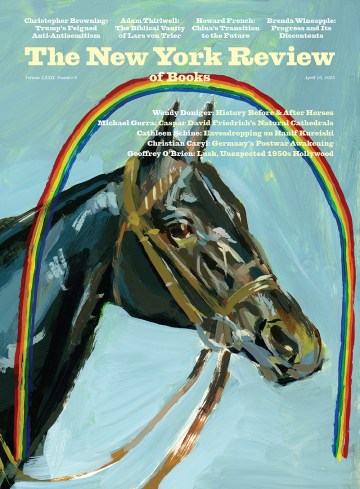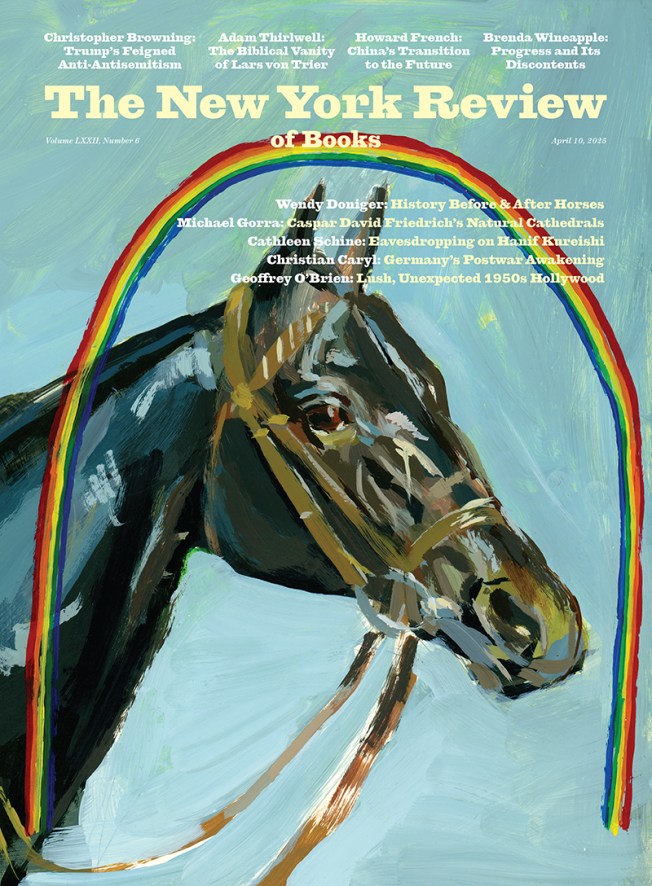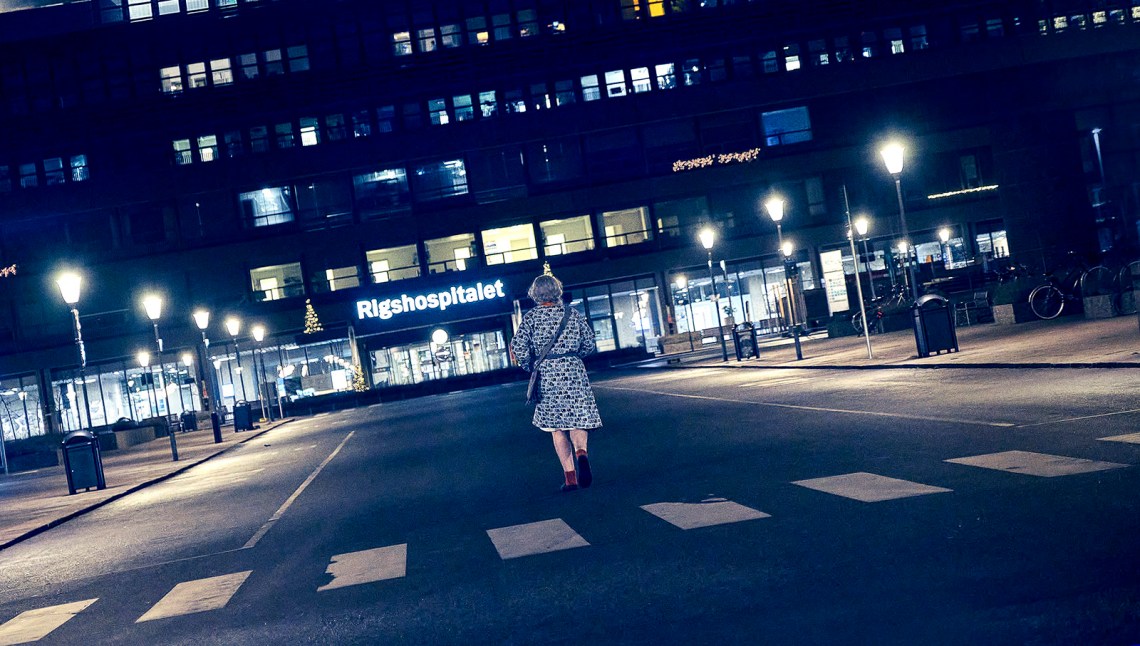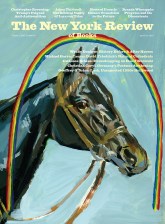The first two seasons of the Danish director Lars von Trier’s TV series The Kingdom, which aired in the 1990s, committed extravagant damage to the genre of hospital drama. Even then von Trier’s name was routinely, brutally coupled with the term provocateur, and his first provocation in The Kingdom was to make a soap opera about a hospital where the doctors weren’t good-looking or vibrating with noble sentiment but were generally corrupt or insane. The most rational people in it were a comical duo: Mrs. Drusse, a spiritualist old lady who manages to infiltrate herself into the neurological ward with an imaginary illness, and her son, Bulder, an alcoholic hospital porter in his fifties. It was set in Copenhagen’s Rigshospitalet—a name that could roughly be translated as the Kingdom’s Hospital, and “Riget,” or the Kingdom, von Trier discovered, was used by its doctors as the hospital’s affectionate nickname. The Kingdom took place inside this labyrinth of a hospital, but that kingdom was also the rotten kingdom of Denmark and the alternative kingdom of the afterlife.
Some of its many plotlines included a medical student who steals a severed head to impress and seduce a nurse in charge of a sleep clinic, a crazed doctor who has a dying patient’s giant liver tumor transplanted into his own body to enable his ambitious research into cancers of the liver, and a Swedish doctor’s efforts to evade investigation after his operation on a girl named Mona has caused extensive damage to her brain. These were stories of human mania and corruption, but the most important stories weren’t human at all, which was von Trier’s further provocation. This medical drama was strafed with supernatural presences: the ghost of a girl sensed by Mrs. Drusse in an elevator shaft; a demon who has impregnated Judith, one of the hospital doctors, whose baby, when it’s finally born, is a giant, suffering, misshapen, outlandish creature, played with infinitely vulnerable delicacy by Udo Kier.
All this was narrated with an insouciantly multiple range of framing devices: a pre-credits sequence that explained over ghostly images how the hospital, in a doomed attempt to replace superstition with science, was built over the swamplike ponds where people once came to bleach linen; then a credits sequence in the style of much-less-wacko 1980s lunchtime soaps; within the show, a chorus of two wise and amused dishwashers, both of whom had Down syndrome; and finally, over the end credits of each episode, the young and dapper von Trier in evening dress in front of a Hitchcockian (or Lynchian) curtain offered his own mischievous, gnomic commentary on what had just happened.
The art of cinema in its brief existence has often found itself investigating the supernatural, which it has to figure through a play on what’s visible and what’s invisible. Eventually that investigation overcame television too. A few years before The Kingdom, David Lynch had made Twin Peaks, in which he perfected his grammar of uncanny transitions and discontinuous elements to present unfathomable mystery. As if in wild European response, the first two seasons of The Kingdom were a panorama not just of the human but also of the less than and more than human. The fantastical in this show was manifested through a vocabulary of wild handheld camera movements, repeated musical motifs, prosthetic organs and seeping flesh, and images fuzzily projected over one another, like Victorian daguerreotypes of flower fairies. And everything was bathed in a strangely sepia light.
As for its meaning—meaning has always been an anxiety for von Trier’s critics. The Kingdom had an unstable, gloopy, unique tone, and it was difficult to find a way to describe it. Not that this was unusual. No one has ever seemed consistently convinced of von Trier’s seriousness or sincerity. His reputation for disingenuous public pronouncements and offensive on-set behavior has acquired such a history—a press conference at Cannes where he said he understood Hitler, the violent mistreatment of Björk on the set of Dancer in the Dark (2000), a pro-Russia post on Instagram during the war in Ukraine—that anything he makes seems too blurred to be readable. And then, in 2022, twenty-eight years after the first season of The Kingdom, von Trier released a third season, a finale, this time with a subtitle: Exodus.
My theory is that every essay on von Trier should come with an apologetic subtitle: “On (the Impossibility of) Religious Art in the Twenty-First Century.”
There was always meant to be a third season of The Kingdom that would somehow conclude its storylines, but two of the main actors died not long after the second season aired in 1997: Ernst-Hugo Järegård, who played the pompous Swedish doctor Stig Helmer, and Kirsten Rolffes, who played the spiritualist Mrs. Drusse. And so the project disappeared. The only hint von Trier offered about a third season was in 1999 in a book of conversations with the journalist Stig Björkman, where he talked about the problem of making a horror show that also contained such absurd and comedic elements: “The Kingdom 3 will have to be a lot more evil. The film will have to reclaim some of its danger…. The Kingdom 3 has got to be seriously dangerous.”
Advertisement
Not, however, that this final season seems so obviously dangerous at all. The first impression is of an apparatus so meticulously self-observing that it feels oddly arid—a ghostly system of replicas and repetitions. Because the actor who played Mrs. Drusse is dead, von Trier has invented a kind of copy: an old woman called Karen, played by Bodil Jørgensen. Because the actor who played Mrs. Drusse’s son, Bulder, is also dead, he has found an actor, Nicolas Bro, who resembles the original actor, and cast him as another hospital porter called Balder but known to everyone as Bulder, in homage to his predecessor. And because the actor who played Dr. Helmer is dead, he has invented one of his children, Dr. Helmer Jr., played by Mikael Persbrandt. On this fragile trio the series then performs its more minute variations, while fans of the earlier seasons mill around the hospital’s wards on guided tours, gawk at souvenirs of the series, and mutter that the second season was never as good as the first.
“I know it’s a repeat, but it’s the right repeat,” says Karen as she enters the neurological ward with an invented illness, just like Mrs. Drusse before her. A show needs its mantra, and this is Exodus’s: a series convinced that reenactment will lead to relief.
It opens on a dark-blue night with a view of a house lit with Christmas lights. Inside, beside an undecorated Christmas tree, Karen is watching the final scenes of the previous season of The Kingdom on something as beautifully old-fashioned as a DVD—a technology that didn’t really exist when the first seasons aired and doesn’t really exist now. “That’s no ending,” she says, disappointed. She writes down the names of the main characters in a notebook as if working out a puzzle, then goes to bed, where she hangs a bell around her neck and binds herself to the bed frame with rope.
It turns out that she is a sleepwalker, and these are her precautions. Asleep, she is racked by nightmares: “The Kingdom isn’t well yet,” she says, or a ghostly voice says through her. She unties the knots that bind her. Then she gets into slippers and an elephant-print dressing gown that becomes her uniform throughout the series, the way Mrs. Drusse had her own uniform, although her dressing gown was a muted pink. Outside, a dreamlike taxi is waiting. It takes her to the Rigshospitalet. At the entrance she doesn’t set off the revolving door’s motion sensors, as if she were a ghost herself. So she turns to leave, but suddenly a bird flutters in and sets the door in motion. Karen enters the hospital, the same music and sepia lighting from the 1990s seasons begin again, and we are back in the old Kingdom.
How can a TV show finish? And especially, how can it finish twenty-five years late? (It was the same question that preoccupied Lynch in his own continuation of Twin Peaks—once again the original to von Trier’s repeat—which came out in 2017.) This was what was worrying me as I watched Exodus. I loved The Kingdom so much when I first discovered it, a couple of years after it came out, when I was about twenty. Its wayward, drastic craziness felt so contemporary, so urgent, and it now made me very anxious, as if there were no way of finishing it that would still feel contemporary. One hint that von Trier had his own hesitations is his postshow commentary, which is now a voice-over, with just two evening shoes from his previous black-tie costume peeking out under the curtain. “I’ve retired a bit physically, so I won’t really appear on screen,” says his voice, curiously moving in how aged it has become, how suddenly fragile.
Why, you might ask? Honestly speaking, out of vanity. The twenty-four years that have passed since the old episodes have left their mark. And I can’t compete with the unbearably cocky young Lars von Trier—and yet vanity is the true killer.
All TV shows operate with a logic of incompletion—every storyline must contain the possibility of its further mutations—which is why finales are so prized and so complicated to arrange, but for The Kingdom this game with resolution contains a more specific desperation. The swarm of plots in the original seasons never found a way of balancing the supernatural and the natural, and it led to the kind of confusion—a hovering between the religious and the farcical, the sacred and the profane—that even twenty-five years earlier von Trier knew was difficult to read.
Advertisement
The voice-over of the credit sequences promises some kind of zombie apocalypse. “The gate to the Kingdom is opening up once again.” In the early seasons this promise of grand supernatural infiltration was reduced to horrors that felt scary but more small-scale: a ghost, a demon’s child. And both of these were elements that existed within a larger system of ordinary farce and misconception. In this final season it’s as if von Trier felt a pressure to increase the sense of panoramic peril. Just as before, humans act with manic perversity. There are aggressive drinking games; sexual harassment claims requiring the services of a meticulously neutral Swedish lawyer, played by Alexander Skarsgård; a hospital director helplessly addicted to playing solitaire on his computer; a group of students clandestinely electrocuting one another while performing MRI brain scans; a doctor who likes scooping out his eyeball, still attached to the optic nerve, which he uses like a periscope. But we are also once again promised the mass horror of ghostly resurrection. “The two have finally arrived,” says the chorus of two dishwashers in the hospital kitchens, “and Exodus can begin. The evil and the good spirits will be led out through the gate to the Kingdom.” In a new addition to the show, Karen discovers in the hospital’s basement another sign of imminent destruction: the famous statue from Elsinore Castle of Ogier the Dane, the legendary hero of Denmark who will awaken when his country needs him to save it from disaster.
A nationalist apocalypse, to match the religious one! The statue of Ogier the Dane becomes some kind of demonic overseer and seems to infect the show’s conversations, in which everyone likes to exaggerate a kind of psychopathic rivalry between Sweden and Denmark, not just in the many arguments between the characters but also in von Trier’s postshow commentary: “Gefjon plowed, according to the myth, Zealand out of Sweden with her oxen sons—after an erotic affair with the Swedish king Gylfi.” It’s as if the early-modern creation of the state of Denmark now represents a primal aggression, a political form of violence that is the national version of universal evil.
Because the truly new thing in this finale is the presence of Grand Duc, aka Beelzebub, whose arrival had been longed for by many characters in the earlier seasons, and who now arrives, a polyglot whose favorite language is Latin, in the form of Willem Dafoe. If I had to hazard a summary of this show’s theology, the machinery behind the multiple subplots, it would be Beelzebub’s plot to get hold of the keys to the Kingdom. His plan is to prevent the evil spirits from being sent to Hell and instead to let them loose in the world so that Satan, his master, can arrive to take rightful control of the universe. Against him there is only Karen, a gentle avatar of female care. Naturally, Beelzebub wins. The evil spirits escape into the world, and the Kingdom begins to disintegrate—and Beelzebub is there at the show’s end to greet Satan as he arrives in a helicopter.
Then the helicopter door opens to reveal von Trier himself, smiling benignly, weak with Parkinson’s, acknowledging his servant’s welcome.
It’s very difficult, thinking about von Trier. It’s very easy to reject him. Flippancy, after all, is a procedure that may be exciting for the artist but only boring for the audience. But it’s also possible that he means exactly what he says, and that this finale is proposing very directly that he is Satan and that, more generally, any director is the incarnation of pure evil. To direct a TV show is just one of the many forms of vanity. It was vanity that he offered as a way of thinking about the series: “Vanity seems to drive all the characters of The Kingdom.” And vanity is biblical. No end on this earth can be achieved. Every human ideal is thwarted. In the melancholy commentary he offers to the first episode of Exodus, he admits to aesthetic failure: “I’ve done my best and everyone is bound to demand more. Much more. That’s only fair as the short came out too short and the long too long.” All our endeavors are poisoned.
The thing about trying to make religious art now is that belief in religion is so splintered and intense that it creates a specific set of artistic problems. Immediately the question of your sincerity arises. For a Christian artist in, let’s say, Naples in 1767, it was possible to make a distinction between religious art—which dealt with religious belief—and the supernatural, which occupied a different, schlockier aesthetic realm. As religion’s power has mutated, the boundary between the sternly religious and the cartoonishly fantastical has smeared. In The Kingdom the supernatural, the theological, and the metafictional all feel part of a single woozy plane, and it makes all theories of tone very confusing.
In 1996, between the first and second seasons of The Kingdom, von Trier made Breaking the Waves. In that film he tries to tell a story about a woman who becomes a martyr, a person who suffers appalling physical and sexual abuse and then dies for a faith, and the proof that she was somehow right to endure these abuses is the final shot of a church’s bells suddenly, supernaturally ringing—bells that throughout the film have been irreparably broken. The problem with this ending is how easily it reads as schmaltz, and the way von Trier attempts to ground it is the detail of the terrible suffering inflicted on the woman, as if the greater the (female) body’s subjection to pain, the greater the proof of something beyond the body. This film began a series for von Trier in which a woman’s suffering is used in an apparently theological story, and it also began a pattern of hostility in his critics and his viewers, who saw these fables as spectacles, pretexts for gleefully misogynistic wounding of the female body. They seemed to place the viewer in an impossibly furious situation, since it wasn’t even obvious how to object to what could always evade rebuke by presenting itself as a joke—just as the appearance of von Trier as Satan in Exodus might be only a bewildering flippancy.
For me the greatest supernatural moment in cinema is the finale of Dreyer’s Ordet (1955), in which by some uncanny orchestration of plot and acting it becomes possible to believe that a character who has died comes back to life. The way this is shown is in the simple fact of a corpse opening its eyes. It’s very difficult to describe the moment’s effect because the supernatural here emerges through such a minute movement, with no prosthetics or lighting tricks. It feels real because you want it to be real. Its best comparison may be with the moment in Shakespeare’s The Winter’s Tale when another miracle seems to happen. Leontes believes that his wife, Hermione, is dead. He is presented with a statue of her. And then the statue seems to come to life and move. Of course, this isn’t exactly a miracle in the same way as the moment in Ordet, because the audience is able to piece together a rational explanation for it—that Hermione was never dead but kept hidden, and that the statue isn’t a statue but a person pretending to be a statue. But still: the miraculous has again been constructed by a plot, so that the supernatural can be figured in something very little, almost nothing—just a woman moving her hand. “Oh, she’s warm!” says Leontes. “If this be magic, let it be an art/Lawful as eating.” And yet at the same time, despite any disenchanting logic that the audience might unravel, something miraculous has still occurred, because Hermione was lost for Leontes, existentially lost, and now she has been found.
The bells, the corpse, the statue: these are all miracles of faith. But for years now von Trier has also been trying to find a way of describing a different sensation: miracles of horror. In his movie Antichrist (2009), Charlotte Gainsbourg tells Willem Dafoe that “nature is Satan’s church.” Von Trier increasingly seems to think so too. His films often feature someone who thinks that the ethical is purely subjective, that suffering doesn’t exist. Then they are forced to learn the horrifying reality of such apparently discarded concepts as damnation, as if it isn’t possible to separate ethics from theology in the way the European twenty-first century would like to do. And one of the most convincing and upsetting aspects of The Kingdom is the way he uses the ordinary body horror of medical telenovelas to lead a contemporary audience into areas it might usually see as outmoded. It has a grammar of sutures and tubes and organs and flesh that satisfies some unearthly fascination with gore—a fascination that seems for von Trier to be a negative proof of the supernatural: not the possibility of goodness but the necessity of evil.
What I mean is: the gore of bodies opened and stitched and knifed that is the ordinary pleasure of hospital drama—to be watched while we fix lunch or sit on a train—is so exaggerated in The Kingdom that its inherent lascivious horror begins to emerge. In Exodus the demonic child known in the earlier seasons as Little Brother has now grown to such proportions that he has merged with the hospital building: his heart is a giant, slick, pulsating, bursting organ inhabiting a storage cupboard. Gore in this show is the surface form of evil because, I think, it is the sign of the natural, which is mortality. Everything leaks, is broken, is weeping. The visual surface von Trier has invented—the seeping walls, the basement concrete, the out-of-date offices and their plastic chairs, all shot as if on some camera from the 1970s—feels like a way of depicting the opposite form of the supernatural: not the transcendentally good but the implacable ruin of our bodies.
I don’t mean there isn’t any version of the good in this show. There is a form of morality that seems to be ethereal, which is the love shown by Judith in both the earlier and the later seasons for her alien, uncontainable baby, and the love shown by Mrs. Drusse and by Karen for the melancholy spirits in the other world. The good, it seems, is mothering. It’s as if you can set up two propositions from this show: to care about supernatural beings is like caring for a child; to care for a child is to care for something supernatural (the way Elena Ferrante mentions a man “leaving, concealed in our flesh, their ghost, like a lost object”). Mothering, like a séance, puts you in contact with the other. It is a form of border crossing. What gives poignancy to Exodus’s melodrama of evil is this unshockable care displayed by Karen and Judith in the face of the madness and affliction around them. So that finally the deepest horror may not be the gore and the blood and the death but the small, farcical ways Grand Duc finds to outwit our only protectors.
One of the most moving aspects of Exodus, which often seems so thin compared to its earlier avatars, is contained precisely in the inescapable effect of the twenty-five-year delay in its making: its remaining actors aged, their faces remodeled in soft and tender ways no prosthetic could achieve, in particular Judith, played by Brigitte Raaberg, last seen as a young doctor ravaged by anguish for her child, still patiently listening for him. Time, of course, is what TV has over cinema, and it’s become habitual to say that this means TV can be a medium for the deeper exploration of character, as if a TV series could be in some way a vastly elongated film. But I think this underestimates the differences between the two.
TV has always been about the refusal of resolution, the constant machinery of suspense, whereas the best cinema finds ways of depicting time, partly because a film is a single unit. A TV show, however, is most urgently interested in making time pass, in an ideally endless series of events whose consequences can therefore be only imperfectly felt by its characters. In Exodus, that narcotic haze becomes a way of approaching its final theological meaning. The multiple plots that seemed to overwhelm the earlier seasons are now allowed to jostle and displace one another, so that as the forces of good try to gather they are minutely, implacably diverted from their intentions. Intended effects are separated from their causes.
A system where causes and effects don’t match up is also known as farce, and the most lasting provocation of Exodus may be its resolution that farce is the form that evil takes, the form that best demonstrates that our world is Satan’s church. For the duration of a scene, or even a short sequence of scenes, perhaps, the good can maintain itself—but time, or Beelzebub, is ingenious in his inventions. Until in the show’s finale all of Karen’s desperate planning, which seems to be finally and miraculously about to succeed in sorting the evil spirits from the good, is dissolved, simply because she misreads a map upside down on a phone.
It has to be minute, the supernatural. In Ordet, a woman opening her eyes was a proof of hopefulness. In Exodus, a momentary confusion with an iPhone screen is the most moving proof of our damnation.




